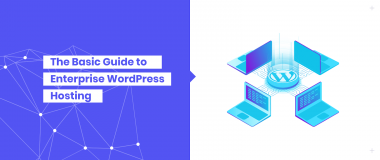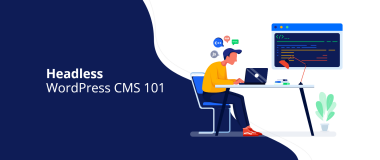Content Management has become a vital part of the success of many businesses as it plays an important role in giving customers a personalized experience. It is the backbone of digital marketing in so many ways, and businesses have to realize this importance. Since it is so central to enterprises, the technology for managing content has advanced and now the way content is created and delivered is highly automated. But the thing is that technology keeps on changing and evolving and what may seem perfect today may not be so grand tomorrow. As a business that treats its content seriously, you need a CMS that is sure to keep up with the changing trends.
Following are three traits a good CMS should possess to be fit for the present as well as the future:
Related: WordPress Timeline: Following The Path To Success (Infographic)
1. Creating Content with an Audience in Mind
While creating and storing content for your business is the basic job of a CMS, it is simply not enough on its own. Instead of just creating content, the CMS needs to target specific audiences and create content according to their preferences. For this, the CMS will need technology to carry out an in-depth analysis of customer behavior. It will need to experiment with content to learn more about the target audience. The management will include managing multiple versions like mobile-specific content or content in different languages.
There are no questions about the necessity of this ability as it will serve as the gateway to your content’s success. Being relevant to the audience is the game here and personalization is imperative to attract an audience and keep them engaged. For a large enterprise, the audience could be highly diversified and a single-themed, one for all kind, the content will not work here. You need to put the audience into categories and match the appropriate content to them with the help of data analytics and a bit of experimentation. When you know what will work with whom, the rest of the job becomes simple and the results are optimized.
Why should the CMS be capable of this? The reason is that content creators or marketers cannot analyze data and consumer behavior on their own. Manually studying the data and analyzing it would take ages and most likely would not be accurate. A CMS, on the other hand, will automate the process and use complex algorithms to produce results as close to reality as possible. The outcome is a smooth workflow and prompt results that help marketers make important decisions about content.
2. Integration with Other Systems
You must have seen a Tug of War match. Marketing and content managing can be seen in these terms. There remains a strong need for unity for a team to be able to win. A CMS needs to be able to integrate with other systems in order to create the best results. Besides being easy to use, the CMS has to be designed to work with other systems and tools so as to cope with the emerging needs e.g. e-commerce functions or database.
The benefit of this integration ability is that your content improves greatly with the help of other tools and systems. It also considerably improves the flow of operations and everything stays connected with each other. To achieve this, you should go for an open source CMS. It will allow you to make modifications according to your own needs and systems.
In contrast, a CMS without the ability to connect with other systems may pose several problems. It may be easy to use on its own, but you cannot use it with the existing systems within your organization. That makes the system isolated which is not good for your business.
3. Ability to Adapt
The CMS should be fully prepared to adapt to future changes and for that it will need flexibility and speed to adopt changes and handle future circumstances. A CMS designed to solve current problems only is of no use to your enterprise as it may work for a year or two but not more. How do you know if a CMS is able to keep up with the changing trends in the future? It should have customization options that allow flexibility of changes. The dialog for upgrades should always be there even after signing the licensing agreement.
You cannot know what capabilities you may need with the CMS in the future, so it is best to prepare for it in advance. As and when the need arises, you can request for additions and/or changes. Customer support should be friendly, efficient and smooth as well – an indicator of a CMS that is ready for future changes.
As an enterprise, it becomes your job to find a CMS vendor that promises this flexibility of change. An open source CMS is a good call too as you can make changes in the future according to your own needs. But since you did not create the CMS, it is better to have the vendor create the changes. Do not rely on solutions limited to the problems of the present, think about what could be the problems in the future and find a CMS that has the flexibility to change.
Why Preparing for the Future is Important?
Keeping in mind the future and having a plan for it is always beneficial no matter what industry it is. Your content is one of the most important assets and can make or break your digital presence. The race now is stiffer than ever before, and everybody knows that high-quality content is the key to success. So constantly improving your content is undoubtedly the only way to achieve the desired results.
Must Read: Here’s a great piece by Skilled.co where they have compared different CMS,
Your sales and conversions heavily depend on your content and if anything is to go wrong with the content, the impact will directly hit your revenue. Every part of your operation is connected with other operations and just like in a human body if one organ aches, the whole body will ache. It will also help you save money because you will not have to get a new system. A CMS that is designed to adapt to changes will work fine for years and years.
Conclusion
There are numerous CMS solutions present out there, so it can get confusing as to which one to choose. The vendors will sell it with all fancy jargon but you have to focus on the above three traits. Communicating your needs is important and you need to know what you want. Remember, it is your business that is on the line and you need to get the best system you possibly can. Make sure you have the liberty to ask for modifications and updates in the future as the only constant thing is change.



![Influencer Marketing Statistics Every Business Should Know [Infographic]](https://devrix.com/wp-content/uploads/2019/10/Influencer-Marketing-Statistics-Every-Business-Should-Know-Infographic@2x-380x160.png)